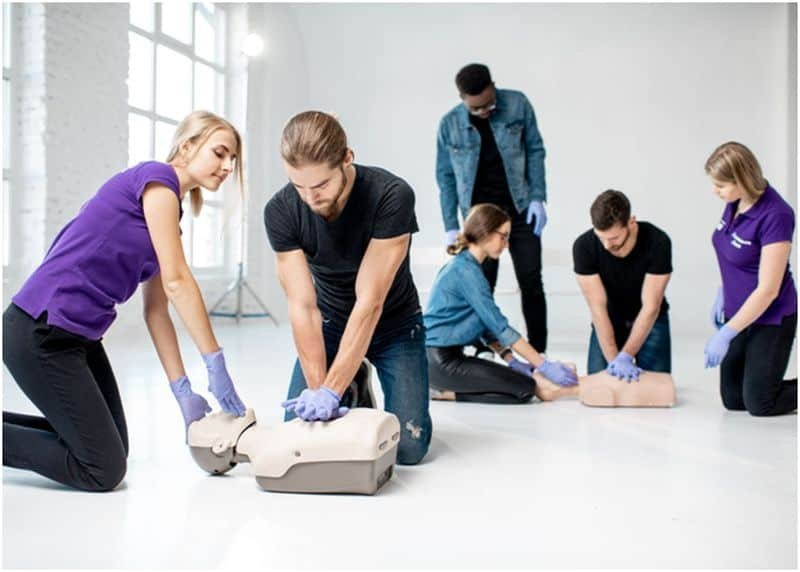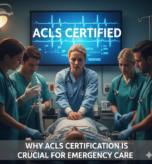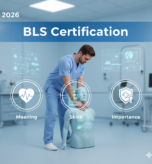In the healthcare field, certifications are essential for ensuring that professionals are equipped to handle life-threatening emergencies. Among the most sought-after certifications are PALS and ACLS certification, both of which are designed to prepare healthcare providers for critical situations. But how do you decide which one is right for you? Understanding the difference between PALS and ACLS is key to making the right choice for your career in the UAE.
Whether you’re a nurse, doctor, paramedic, or any other healthcare professional, these certifications can significantly enhance your ability to provide high-quality care. Let’s dive deeper into what PALS and ACLS certification entail, how they differ, and which one you might need.

What is ACLS Certification?
ACLS (Advanced Cardiovascular Life Support) certification focuses on managing adult patients experiencing cardiovascular emergencies such as cardiac arrest, stroke, and arrhythmias. It builds on the foundational skills taught in Basic Life Support (BLS) and incorporates advanced techniques like airway management, pharmacology, and ECG interpretation.
ACLS is ideal for healthcare professionals working in emergency departments, intensive care units, and other critical care settings. The training emphasizes evidence-based practices and team dynamics to ensure effective and coordinated care during emergencies.
If you’re looking to enhance your skills in managing adult emergencies, enrolling in an ACLS PALS Certification program is a great step forward. This certification is not only a requirement for many healthcare roles but also a valuable addition to your professional credentials.
What is PALS Certification?
PALS (Pediatric Advanced Life Support) certification, on the other hand, is specifically designed for managing emergencies in infants and children. It focuses on pediatric-specific conditions such as respiratory distress, shock, and cardiac arrest. The course emphasizes the unique anatomy, physiology, and medical needs of pediatric patients.
PALS training equips healthcare providers with the skills to recognize and respond to life-threatening pediatric emergencies. It also includes advanced techniques like airway management, medication administration, and post-resuscitation care tailored to children.
PALS is essential for healthcare providers who work in pediatric care, emergency departments, or intensive care units. If your role involves caring for young patients, obtaining a BLS ACLS PALS Certification is crucial for providing high-quality care.
The Difference Between PALS and ACLS
While both certifications aim to equip healthcare providers with life-saving skills, the difference between PALS and ACLS lies in their target audience, focus areas, and application. Here’s a detailed breakdown:
1. Target Audience
- ACLS: Designed for healthcare professionals managing adult patients in critical care or emergency settings. This includes doctors, nurses, paramedics, and other medical staff who frequently deal with cardiovascular emergencies in adults.
- PALS: Tailored for those caring for pediatric patients, including pediatricians, nurses, and emergency responders. It is ideal for professionals working in pediatric wards, neonatal units, or emergency departments that handle children.
2. Focus Areas
- ACLS: Covers advanced interventions for adult cardiovascular emergencies, including arrhythmias, stroke, and cardiac arrest. It also emphasizes the use of advanced medical equipment and pharmacological interventions.
- PALS: Focuses on pediatric-specific emergencies, such as respiratory distress, shock, and cardiac arrest in children. The training includes techniques and protocols that are unique to the pediatric population.
3. Complexity
- ACLS: Requires a strong understanding of adult anatomy, pharmacology, and ECG interpretation. It is more complex than Basic Life Support (BLS) and is designed for advanced healthcare providers.
- PALS: Emphasizes pediatric-specific techniques and the unique needs of infants and children. It requires a solid understanding of pediatric anatomy and physiology.
3. Complexity
- ACLS: Requires a strong understanding of adult anatomy, pharmacology, and ECG interpretation. It is more complex than Basic Life Support (BLS) and is designed for advanced healthcare providers.
- PALS: Emphasizes pediatric-specific techniques and the unique needs of infants and children. It requires a solid understanding of pediatric anatomy and physiology.
Do You Need Both Certifications?
Whether you need PALS and ACLS certification depends on your role and the patient population you serve. Here are some scenarios to help you decide:
- ACLS Certification: If you work in emergency departments, intensive care units, or any setting where you manage adult patients, ACLS is essential. It equips you with the skills to handle complex cardiovascular emergencies in adults.
- PALS Certification: If your role involves caring for infants and children, such as in pediatrics or neonatal care, PALS is a must. It ensures you’re prepared to manage pediatric-specific emergencies.
- Both Certifications: Many healthcare professionals choose to obtain both certifications to expand their skill set and career opportunities. For example, emergency responders and critical care nurses often benefit from having both PALS and ACLS certification.
Why Choose Certification in the UAE?
The UAE is home to world-class healthcare facilities, making it essential for professionals to stay updated with the latest certifications. By obtaining an ACLS PALS Certification or BLS ACLS PALS Certification, you’ll not only enhance your skills but also contribute to improving the standard of care in the region.
Healthcare providers in the UAE are expected to meet international standards, and certifications like ACLS and PALS are often mandatory for roles in emergency and critical care. These certifications demonstrate your commitment to professional development and your ability to provide high-quality care.

How to Get Certified?
If you’re ready to pursue PALS and ACLS certification, choosing the right training provider is crucial. Prime Wellness Training Institute offers comprehensive courses designed to meet international standards. Here’s what you can expect:
- Accredited Training: Courses are accredited by recognized organizations, ensuring the highest quality of education.
- Experienced Instructors: Learn from certified professionals with extensive experience in emergency and critical care.
- Hands-On Practice: Gain practical experience through simulations and real-life scenarios.
- Flexible Scheduling: Choose from in-person or online training options to fit your busy schedule.
By enrolling in their programs, you’ll gain the confidence and expertise needed to handle emergencies effectively.
Benefits of ACLS and PALS Certification
Earning PALS and ACLS certification offers numerous benefits, including:
- Career Advancement: Many healthcare facilities require these certifications for roles in emergency and critical care. Having both certifications can open doors to new opportunities.
- Enhanced Skills: The training provides hands-on experience with advanced medical equipment and techniques, preparing you for real-world challenges.
- Professional Credibility: These certifications demonstrate your commitment to providing high-quality care and staying updated with the latest medical practices.
- Improved Patient Outcomes: Both certifications equip you with the knowledge and skills to act quickly and effectively in life-threatening situations, significantly improving patient outcomes.
Conclusion
Understanding the difference between PALS and ACLS is essential for healthcare professionals looking to advance their careers in the UAE. Whether you need PALS and ACLS certification or just one of them depends on your role and the patient population you serve.
By enrolling in an ACLS PALS Certification or BLS ACLS PALS Certification, you’ll gain the skills and confidence needed to excel in your field. These certifications are not just credentials—they’re a testament to your ability to save lives and provide exceptional care.
Take the next step in your career and equip yourself with the expertise to make a difference when it matters most.



